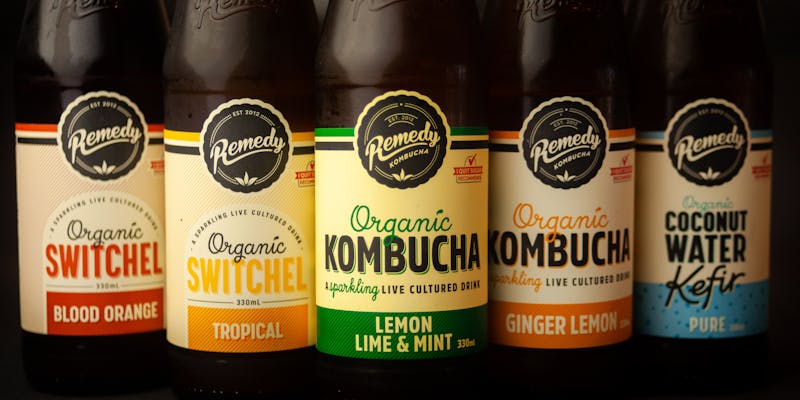Eating Right for Eczema: Best and Worst Foods Revealed
Nov 05, 2024 By Isabella Moss
Eczema, a common skin condition characterized by itchy, inflamed patches, affects numerous individuals worldwide. Managing eczema involves more than just topical treatments; dietary choices play a pivotal role in alleviating or exacerbating symptoms. Certain foods can trigger flare-ups, while others may contribute to healthier skin and aid in reducing inflammation. Understanding which foods to incorporate and which to avoid can significantly impact the management of this chronic condition. In this guide, we will explore the five best foods that promote skin healing and the five worst offenders that can aggravate eczema.
The Best Foods for Eczema

Fatty Fish
Fatty fish such as salmon, mackerel, and sardines are rich in omega-3 fatty acids, which have potent anti-inflammatory properties. Omega-3s can help reduce the inflammation associated with eczema, potentially leading to fewer flare-ups and more manageable symptoms. Including these fish in your diet can also promote overall skin health, making them a valuable addition to an eczema-friendly diet.
Leafy Greens
Leafy greens like spinach, kale, and Swiss chard are packed with essential vitamins and minerals, including vitamin C and zinc, that support skin repair and rejuvenation. These greens are also rich in antioxidants, which help protect the skin from environmental damage. Incorporating a variety of leafy greens into meals can enhance skin resilience and aid in maintaining a balanced immune system, which is crucial for managing eczema.
Quinoa
Quinoa is a nutrient-dense grain that is naturally gluten-free, making it a suitable option for those with gluten sensitivities that can exacerbate eczema symptoms. It is an excellent source of protein, fiber, and essential minerals such as magnesium and phosphorus, which support skin health. Additionally, quinoa contains antioxidants that can help reduce inflammation and support overall immune function, crucial for managing eczema effectively. Incorporating quinoa into your diet can provide a versatile, healthful base for meals while potentially easing eczema-related discomfort.
Probiotic-Rich Foods
Probiotic-rich foods, such as yogurt, kefir, sauerkraut, and kimchi, can play a beneficial role in managing eczema by supporting gut health. A healthy gut microbiome can positively influence skin health and immune function, potentially leading to reduced eczema flare-ups. The probiotics found in these foods help balance the gut bacteria, promote digestion, and enhance the body's natural defenses. Regular consumption of probiotic-rich foods can strengthen the skin's barrier function and improve its resilience against irritants and inflammation.
Turmeric
Turmeric is a vibrant yellow spice known for its anti-inflammatory and antioxidant properties, largely attributed to the compound curcumin. Incorporating turmeric into your diet may help alleviate eczema symptoms by reducing inflammation and supporting skin healing. It can be added to a variety of dishes, such as curries, soups, and smoothies, or consumed as a supplement. For those with eczema, using turmeric as part of an overall dietary strategy can offer a natural way to manage flare-ups and support healthy skin.
The Worst Foods for Eczema
Dairy Products
Dairy products, including milk, cheese, and yogurt, are common culprits that can exacerbate eczema symptoms for some individuals. The proteins found in dairy, such as casein and whey, may trigger inflammation and allergic reactions in susceptible people. Additionally, those with lactose intolerance may experience digestive issues that could indirectly impact skin health. Reducing or eliminating dairy products from the diet may help some individuals manage their eczema more effectively and decrease the frequency of flare-ups.
Gluten-Containing Grains
For individuals sensitive to gluten, consuming grains like wheat, barley, and rye can lead to increased inflammation and potentially worsen eczema symptoms. Gluten sensitivity or celiac disease can exacerbate autoimmune responses, resulting in skin irritation and flare-ups. Opting for gluten-free alternatives, such as quinoa, rice, or gluten-free oats, can help alleviate these symptoms and promote better skin health.
Processed Foods
Highly processed foods often contain artificial additives, preservatives, and unhealthy fats, all of which can contribute to inflammation and exacerbate eczema symptoms. Foods such as fast food, packaged snacks, and ready-to-eat meals may also be high in sugar and salt, further aggravating the skin condition. Minimizing consumption of processed foods and replacing them with whole, nutrient-rich options can support skin health and overall well-being.
Sugary Foods
Excessive sugar intake can lead to inflammation in the body, potentially worsening eczema symptoms. Sugary foods such as candies, sodas, and baked goods can cause spikes in insulin levels, which may trigger inflammatory responses. By reducing sugar consumption and opting for natural sweeteners like honey or fruits, individuals with eczema can potentially experience less irritation and fewer flare-ups.
Eggs
For some people with eczema, eggs can act as a trigger food, provoking allergic reactions that exacerbate skin inflammation. The proteins in eggs, particularly in the whites, may lead to an immune response resulting in itchy, inflamed skin. Identifying and avoiding eggs in the diet can be a crucial step for individuals sensitive to this food, helping to reduce flare-ups and improve skin condition.
Lifestyle Tips for Managing Eczema

In addition to dietary adjustments, incorporating certain lifestyle habits can significantly aid in managing eczema symptoms effectively. Here are some practical tips to consider:
Moisturize Regularly
Keeping the skin hydrated is essential to managing eczema. Regular application of moisturizers can help to repair the skin barrier, reducing dryness, itching, and the risk of flare-ups. Opt for fragrance-free, hypoallergenic moisturizers that are designed for sensitive skin and apply them immediately after bathing to lock in moisture.
Avoid Triggers
Identifying and avoiding environmental triggers can significantly alleviate eczema symptoms. Common culprits include detergents, harsh soaps, stress, and allergens like dust mites, pet dander, and pollen. By establishing a hypoallergenic home environment and using gentle, fragrance-free personal care products, individuals can effectively minimize their exposure to irritants.
Wear Soft, Breathable Fabrics
Choosing clothing made from soft, breathable fabrics like cotton can reduce skin irritation and prevent eczema flare-ups. Avoid rough fabrics such as wool or synthetic materials that may cause itching and discomfort. Washing new clothes before wearing them can also help remove potential irritants.
Practice Stress Management
Stress can exacerbate eczema symptoms, so incorporating stress-reducing practices can be beneficial. Techniques such as mindfulness, yoga, deep breathing exercises, and regular physical activity can help improve overall mental health and reduce stress levels, leading to a calmer and more manageable skin condition.
Bathe with Care
Taking warm, rather than hot, baths or showers and limiting their duration can help prevent skin from drying out. Incorporating gentle, moisturizing cleansers and avoiding harsh soaps can further protect the skin. After bathing, gently pat the skin dry with a soft towel and apply moisturizer to help lock in moisture.
Conclusion
Managing eczema involves a comprehensive approach that includes both dietary adjustments and lifestyle modifications. By identifying and avoiding trigger foods, such as dairy, gluten, and processed items, individuals can reduce inflammation and minimize the likelihood of eczema flare-ups. Incorporating beneficial foods like probiotics and turmeric offers additional support for skin health. Coupled with lifestyle habits such as regular moisturizing, stress reduction, and cautious bathing routines, individuals can actively work towards maintaining healthier skin and reducing the impact of eczema on daily life. Each person's journey with eczema is unique, so it's important to tailor these recommendations to individual needs and, when necessary, consult healthcare professionals for personalized guidance.
On this page
The Best Foods for Eczema Fatty Fish Leafy Greens Quinoa Probiotic-Rich Foods Turmeric The Worst Foods for Eczema Dairy Products Gluten-Containing Grains Processed Foods Sugary Foods Eggs Lifestyle Tips for Managing Eczema Moisturize Regularly Avoid Triggers Wear Soft, Breathable Fabrics Practice Stress Management Bathe with Care Conclusion
An Overview of Fitness Trends: Navigating a Healthier Tomorrow

Cinnamon and Weight Loss: Exploring Myth and Reality

Choosing the Right Cardio Machine for Your Fitness Goals

Pull-up Breathing techniques: A Guide to Proper Technique

Kombucha: 5 Powerful Health Benefits of This Probiotic-Rich Beverage

Essential Guide to Resuming Exercise Postpartum with Assurance and Vigor

Exercise for Older Adults - Navigating Chronic Conditions

Are Electrolyte-Loaded Sports Drinks Healthy: An Understanding

Atrial Fibrillation: Common Causes, Symptoms, Treatment, And More

Fitness Hacks, Recommended By Personal Trainers:
